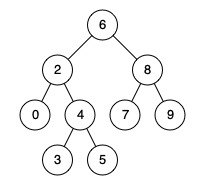Algorithm
Problem Name: 235. Lowest Common Ancestor of a Binary Search Tree
Given a binary search tree (BST), find the lowest common ancestor (LCA) node of two given nodes in the BST.
According to the definition of LCA on Wikipedia: “The lowest common ancestor is defined between two nodes p and q as the lowest node in T that has both p and q as descendants (where we allow a node to be a descendant of itself).”
Example 1:

Input: root = [6,2,8,0,4,7,9,null,null,3,5], p = 2, q = 8 Output: 6 Explanation: The LCA of nodes 2 and 8 is 6.
Example 2:

Input: root = [6,2,8,0,4,7,9,null,null,3,5], p = 2, q = 4 Output: 2 Explanation: The LCA of nodes 2 and 4 is 2, since a node can be a descendant of itself according to the LCA definition.
Example 3:
Input: root = [2,1], p = 2, q = 1 Output: 2
Constraints:
- The number of nodes in the tree is in the range
[2, 105]. -109 <= Node.val <= 109- All
Node.valare unique. p != qpandqwill exist in the BST.
Code Examples
#1 Code Example with C Programming
Code -
C Programming
struct TreeNode* lowestCommonAncestor(struct TreeNode* root, struct TreeNode* p, struct TreeNode* q) {
if (root == NULL) {
return NULL;
}
if (root->val > p->val && root->val > q->val) {
return lowestCommonAncestor(root->left, p, q);
}
if (root->val < p->val && root->val < q->val) {
return lowestCommonAncestor(root->right, p, q);
}
return root;
}
Input
Output
#2 Code Example with C++ Programming
Code -
C++ Programming
class Solution {
public:
TreeNode* lowestCommonAncestor(TreeNode* root, TreeNode* p, TreeNode* q) {
int Min = min(p->val, q->val);
int Max = max(p->val, q->val);
if(root->val < = Max && root->val >= Min) return root;
if(root->val > Max) return lowestCommonAncestor(root->left, p, q);
return lowestCommonAncestor(root->right, p, q);
}
};
Input
Output
#3 Code Example with Javascript Programming
Code -
Javascript Programming
const lowestCommonAncestor = function(root, p, q) {
while((root.val - p.val) * (root.val - q.val) > 0) {
root = root.val > p.val ? root.left : root.right
}
return root
};
Input
Output
#4 Code Example with Python Programming
Code -
Python Programming
class Solution:
def lowestCommonAncestor(
self, root: "TreeNode", p: "TreeNode", q: "TreeNode"
) -> "TreeNode":
if p.val < root.val > q.val:
return self.lowestCommonAncestor(root.left, p, q)
if p.val > root.val < q.val:
return self.lowestCommonAncestor(root.right, p, q)
return root
Input
Output
#5 Code Example with C# Programming
Code -
C# Programming
namespace LeetCode
{
public class _0235_LowestCommonAncestorOfABinarySearchTree
{
public TreeNode LowestCommonAncestor(TreeNode root, TreeNode p, TreeNode q)
{
if (p.val > q.val) return LowestCommonAncestor(root, q, p);
if (root.val >= p.val && root.val < = q.val) return root;
if (root.val < p.val && root.val < q.val) return LowestCommonAncestor(root.right, p, q);
else return LowestCommonAncestor(root.left, p, q);
}
}
}
Input
Output
